
 Monday, June 17, Eleventh Week in Ordinary Time
Monday, June 17, Eleventh Week in Ordinary Time
 ST. GIUSEPPE CAFASSO (Italy, 1811-1860), Priest
ST. GIUSEPPE CAFASSO (Italy, 1811-1860), Priest
One of the extraordinary 'social saints' of 19th-century Turin, Cafasso was a teacher of John Bosco at the seminary
and encouraged him to establish the Salesian Order. Known from his youth for his humility and prayerfulness, he was
particular vigilant against the prevalent Jansenism in his day and its obsession with sin and damnation. He urged
his students to read Francis de Sales and Alphonsus Liguori to temper Jansenist rigorism. An excellent preacher,
he encouraged daily Communion and devotion to the Blessed Sacrament. He also distinguished himself as a confessor
for condemned prisoners, for which he has been called 'the priest of the gallows'. He died from severe pneumonia.
He was canonized in 1947.
AT THE VATICAN, Monday, June 17, 2013
Pope Francis met with
= H.E. Nicolás Maduro, President of the REpublic of Venezuela, and his delegation
- H.E. il Signor Rowsch N. Shaways, Vice Prime Minister of the Republic of Iraq, and his delegation
- Cardinal Joseph Zen Ze-kiun, S.D.B., emeritus Bishop of Hongkong
 One year ago...
One year ago...
At the Sunday Angelus, Benedict XVI reflected on two parables by Jesus - about the seed that grows by itself whether it is cared for or not, and the mustard seed, Jesus's favorite image, for great things that can grow out of the tiniest beginnings. He also gave thanks for the 50th International Eucharistic Congress that closed in Dublin on this day, and pointed out that June 20 will be the World Day for Refugees. He called attention to the beatification today in Italy of Cecilia Eusepi, who died at 18 of an ailment
that kept her from becoming the missionary sister she wanted to be.
ANGELUS TODAY
June 17, 2012
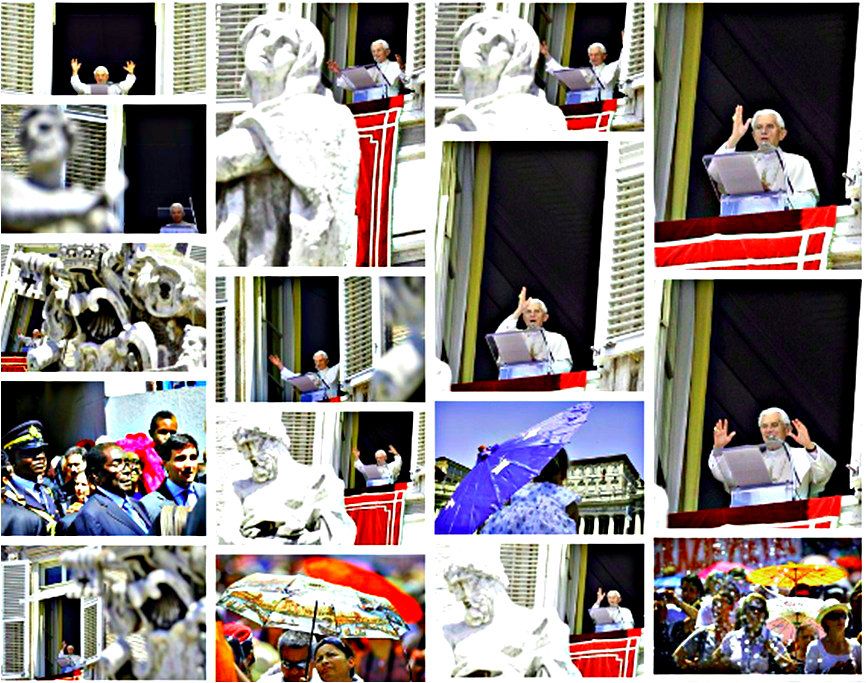 Here is a full translation of the Holy Father's words:
Here is a full translation of the Holy Father's words:
Dear brothers and sisters,
Today's liturgy offers us two brief parables of Jesus: that of the seed that grows by itself, and that of the mustard seed (cfr Mc 4,26–34).
Through images taken from the world of farming, the Lord presents the mystery of the Word and of the Kingdom of God, and shows us the reasons for our hope and our commitment.
The first parable calls attention to the dynamism of sowing: the seed that is cast on the soil, whether the farmer is awake or asleep, germinates and grows by itself.
Man sows in the confidence that his work will not be fruitless. What sustains the farmer in his daily efforts is precisely his trust in the strength of the seed and the goodness of the soil.
This parable recalls the mystery of creation and redemption, of God's fruitful work in history. He is the Lord of the Kingdom, and man is his humble co-worker who contemplates and rejoices in God's creative action and awaits its fruits with patience.
The final harvest makes us think of God's conclusive intervention at the end of time when he will fully realize his Kingdom. The present is the time of sowing, and the growth of the seed is assured by the Lord.
Every Christian, therefore, knows that he must do all he can but that the final result depends on God{ this awareness sustains him in the effort of everyday, especially in difficult situations. In this regard, St, Ignatius of Loyola wrote: "Act as if everything depends on you, knowing that in fact, everything depends on God" (cfr Pedro de Ribadeneira, Vita di S. Ignazio di Loyola, Milano 1998).
Even the second parable uses the image of the seed. But this time it is a specific seed, the mustard seed, considered the smallest of all seeds. But although it is minute, it is full of life - when it breaks up, it gives birth to a seedling that can break through the ground, to emerge into the sunlight and to grow until it becomes "the largest of plants" (cfr Mk,32): weakness is the strength of the seed, its breaking up is its power.
So it is with the Kingdom of God: it is a reality that is humanly small, made up of those who are poor in heart, who do not trust in their own strength but in the love of God, those who have no importance in the eyes of the world. And yet it is precisely in them that Christ's strength breaks through and transforms what is apparently insignificant.
The image of the seed is particularly dear to Jesus because it expresses well the Kingdom of God. In the two parables today, it represents 'growth' as well as 'contrast': growth which occurs thanks to a dynamic that is inherent in the seed itself, and the contrast between the smallness of the seed and the magnitude of what it produces.
The message is clear: The Kingdom of God, though it demands our collaboration, is first of all a gift of the Lord, a grace that precedes man and his works.
Our puny strength, apparently impotent before the problems of the world, if it is immersed in God's strength, does not fear obstacles, because the victory of the Lord is certain.
It is the miracle of God's love that allows every seed of good sown on earth to germinate and to grow. And the experience of this miracle of love makes us optimistic, in spite of difficulties, sufferings and the evil we encounter.
The seed germinates and grows, because God's love makes it. May the Virgin Mary who, as the 'good earth', accepted the seed of the Divine Word, strengthen in us this faith and this hope.-
After the prayers, he said this:
Next Wednesday, June 20, is the World Day for Refugees, promoted by the United Nations. It is meant to call the attention of the international community to the conditions of so many persons, especially families, who are forced to flee their own countries, because they are threatened by armed conflicts and other serious forms of violence.
For these brothers and sisters who are sorely tested, I assure the prayers and the constant solicitude of the Holy See, and I hope that their rights may always be respected and that they may soon be able to be reunited with their dear ones.
Today, in Ireland, the concluding celebration of the 50th International Eucharistic Congress is taking place. In the past week, Dublin was the city of the Eucharist, where many persons have gathered in prayer in the presence of Christ in the Sacrament of the altar.
In the mystery of the Eucharist, Jesus wishes to remain with us, so that we can enter into communion with him and among ourselves. Let us entrust to the Most Blessed Mary the fruits that have matured in these days of reflection and prayer.
Finally, I wish to remind you with joy that this afternoon, in Nepi, in the Diocese of Civita Castellana, Cecilia Eusepi, who died when she was only 18, will be proclaimed Blessed. This young woman aspired to be a missionary sister but was forced to leave the convent because of illness, which she experienced with unshakable faith, demonstrating a great capacity for sacrifice for the salvation of souls. In the last days of her existence, she repeated, in profound union withe the crucified Christ: "It is beautiful to give oneself to Jesus, who gave everything for us".
Earlier in the day, Benedict XVI addressed the participants of the 50th International Eucharistic Congress which ended in Dublin, with a videomessage that was played at the concluding Mass:
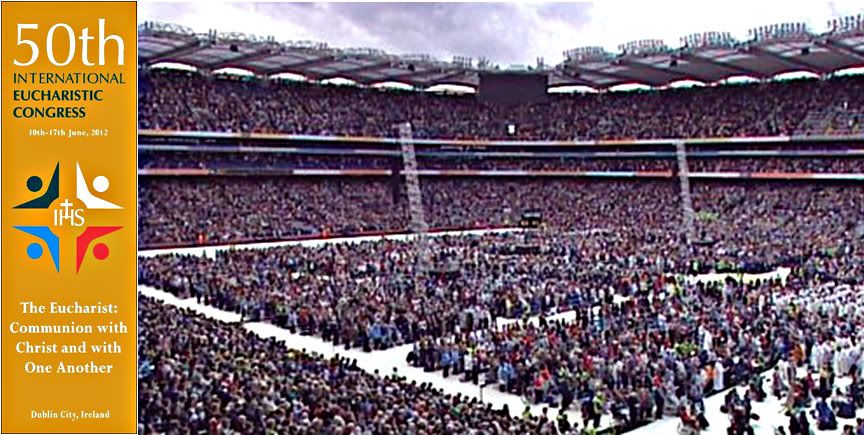 RTE, Ireland's state TV, has this report on the closing Mass of the 50th IEC.
Pope says abuse scandal has shaken
RTE, Ireland's state TV, has this report on the closing Mass of the 50th IEC.
Pope says abuse scandal has shaken
Ireland's Catholic legacy, but
faith must be rediscovered in Christ
and cannot be just 'a matter of habit'

June 17, 2012
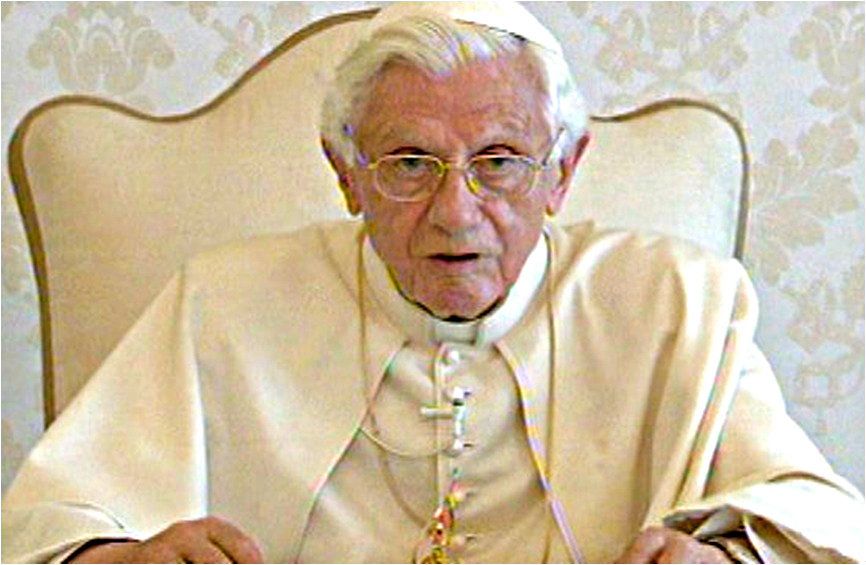
DUBLIN - Pope Benedict has said the legacy of Irish Catholicism has been shaken by the clerical sexual abuse of children.
In a pre-recorded address to the 50th International Eucharistic Congress in Croke Park, the Pope praised the Church in Ireland for its heroic missionaries and its mighty contribution to the good of the world.
But he said the joy sparked by this legacy had been shaken in an appalling way by the abuse of children by priests, brothers and nuns.
Earlier, in his homily, the Papal Legate told the capacity congregation that the Lord heals the Church's wounds.
"Let us rejoice and be glad", Cardinal Marc Ouellet said. "We can rely on the Lord for a new beginning."
He said that God sustains the Church when it experiences limitations and failures and the Lord heals the Church's wounds and strengthens its members' love.
The grey morning skies over GAA headquarters cleared before Cardinal Ouellet proceeded to the alter with nine co-principal celebrants including Cardinal Seán Brady and Archbishop Diarmuid Martin.
Over 1,000 priests registered for the Congress are concelebrating the mass.
In his address, Pope Benedict said much remains to be done on the path to liturgical renewal.
He said Ireland had been shaped by the Mass at the deepest level for centuries and told the congregation that they were heirs to a Church that has been a mighty force for good in the world.
However, he said that force has recently been shaken in an appalling way by the revelation of the sins committed by priests against people entrusted to their care.
He said they abused people and undermined the credibility of the Church's message.
He said: "Instead of showing them the path towards Christ, towards God, instead of bearing witness to his goodness, they abused people and undermined the credibility of the Church's message.
"How are we to explain the fact that people who regularly received the Lord's Body and confessed their sins in the sacrament of Penance have offended in this way? It remains a mystery.
"Yet evidently, their Christianity was no longer nourished by joyful encounter with Jesus Christ: it had become merely a matter of habit."
The Pope also announced that the 2016 International Eucharistic Congress will be held in Cebu in the Philippines.
He received a standing ovation after his message.
In his closing greeting, Archbishop of Dublin Diarmuid Martin, also prayed for the victims of the abuse.
"We have kept in our prayers and in our hearts all those who suffered criminal abuse within the community of Christ's church and all those who feel in any way alienated from the church and who have not experienced in our church the love of Jesus Christ," he added.
President Michael D Higgins and the Taoiseach Enda Kenny were among the congregation in Croke Park.
Earlier, there was a “Gathering Ceremony” featuring soprano Celine Byrne, composer Fr Liam Lawton, the Dublin Deaf Choir and the RTÉ Concert Orchestra among others.
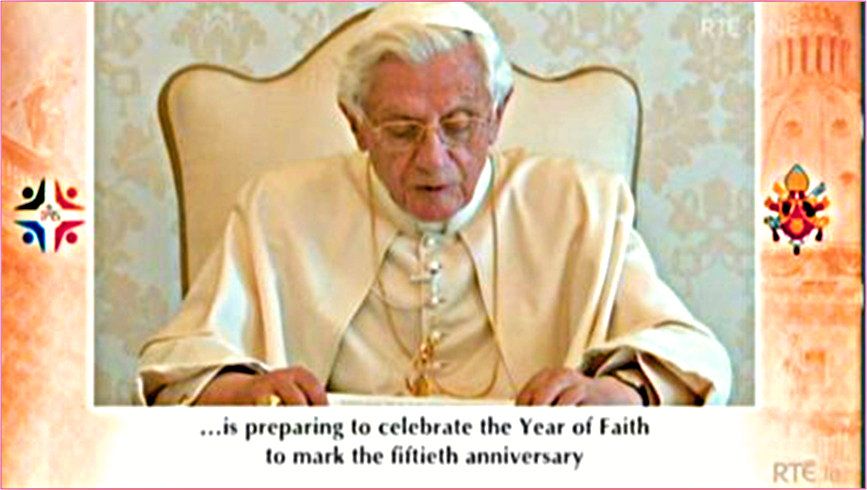 THE POPE'S CLOSING MESSAGE
THE POPE'S CLOSING MESSAGE
TO THE 50TH IEC IN DUBLIN
Dear Brothers and Sisters,
With great affection in the Lord, I greet all of you who have gathered in Dublin for the Fiftieth International Eucharistic Congress, especially Cardinal Brady, Archbishop Martin, the clergy, religious and faithful of Ireland, and all of you who have come from afar to support the Irish Church with your presence and prayers.
The theme of the Congress – Communion with Christ and with One Another – leads us to reflect upon the Church as a mystery of fellowship with the Lord and with all the members of his body.
From the earliest times the notion of koinonia or communio has been at the core of the Church’s understanding of herself, her relationship to Christ her founder, and the sacraments she celebrates, above all the Eucharist.
Through our Baptism, we are incorporated into Christ’s death, reborn into the great family of the brothers and sisters of Jesus Christ; through Confirmation we receive the seal of the Holy Spirit; and by our sharing in the Eucharist, we come into communion with Christ and each other visibly here on earth. We also receive the pledge of eternal life to come.
The Congress also occurs at a time when the Church throughout the world is preparing to celebrate the Year of Faith to mark the fiftieth anniversary of the start of the Second Vatican Council, an event which launched the most extensive renewal of the Roman Rite ever known.
Based upon a deepening appreciation of the sources of the liturgy, the Council promoted the full and active participation of the faithful in the Eucharistic sacrifice.
At our distance today from the Council Fathers’ expressed desires regarding liturgical renewal, and in the light of the universal Church’s experience in the intervening period, it is clear that a great deal has been achieved; but it is equally clear that there have been many misunderstandings and irregularities.
The renewal of external forms, desired by the Council Fathers, was intended to make it easier to enter into the inner depth of the mystery. Its true purpose was to lead people to a personal encounter with the Lord, present in the Eucharist, and thus with the living God, so that through this contact with Christ’s love, the love of his brothers and sisters for one another might also grow.
Yet not infrequently, the revision of liturgical forms has remained at an external level, and “active participation” has been confused with external activity. Hence much still remains to be done on the path of real liturgical renewal. In a changed world, increasingly fixated on material things, we must learn to recognize anew the mysterious presence of the Risen Lord, which alone can give breadth and depth to our life.
The Eucharist is the worship of the whole Church, but it also requires the full engagement of each individual Christian in the Church’s mission; it contains a call to be the holy people of God, but also one to individual holiness; it is to be celebrated with great joy and simplicity, but also as worthily and reverently as possible; it invites us to repent of our sins, but also to forgive our brothers and sisters; it binds us together in the Spirit, but it also commands us in the same Spirit to bring the good news of salvation to others.
Moreover, the Eucharist is the memorial of Christ’s sacrifice on the Cross, his body and blood given in the new and eternal covenant for the forgiveness of sins and the transformation of the world.
Ireland has been shaped by the Mass at the deepest level for centuries, and by its power and grace generations of monks, martyrs and missionaries have heroically lived the faith at home and spread the Good News of God’s love and forgiveness well beyond your shores.
You are the heirs to a Church that has been a mighty force for good in the world, and which has given a profound and enduring love of Christ and his blessed Mother to many, many others.
Your forebears in the Church in Ireland knew how to strive for holiness and constancy in their personal lives, how to preach the joy that comes from the Gospel, how to promote the importance of belonging to the universal Church in communion with the See of Peter, and how to pass on a love of the faith and Christian virtue to other generations.
Our Catholic faith, imbued with a radical sense of God’s presence, caught up in the beauty of his creation all around us, and purified through personal penance and awareness of God’s forgiveness, is a legacy that is surely perfected and nourished when regularly placed on the Lord’s altar at the sacrifice of the Mass.
Thankfulness and joy at such a great history of faith and love have recently been shaken in an appalling way by the revelation of sins committed by priests and consecrated persons against people entrusted to their care. Instead of showing them the path towards Christ, towards God, instead of bearing witness to his goodness, they abused people and undermined the credibility of the Church’s message.
How are we to explain the fact that people who regularly received the Lord’s body and confessed their sins in the sacrament of Penance have offended in this way? It remains a mystery. Yet evidently, their Christianity was no longer nourished by joyful encounter with Jesus Christ: it had become merely a matter of habit.
The work of the Council was really meant to overcome this form of Christianity and to rediscover the faith as a deep personal friendship with the goodness of Jesus Christ. The Eucharistic Congress has a similar aim.
Here we wish to encounter the Risen Lord. We ask him to touch us deeply. May he who breathed on the Apostles at Easter, communicating his Spirit to them, likewise bestow upon us his breath, the power of the Holy Spirit, and so help us to become true witnesses to his love, witnesses to the truth. His truth is love. Christ’s love is truth.
My dear brothers and sisters, I pray that the Congress will be for each of you a spiritually fruitful experience of communion with Christ and his Church.
At the same time, I would like to invite you to join me in praying for God’s blessing upon the next International Eucharistic Congress, which will take place in 2016 in the city of Cebu! To the people of the Philippines I send warm greetings and an assurance of my closeness in prayer during the period of preparation for this great ecclesial gathering. I am confident that it will bring lasting spiritual renewal not only to them but to all the participants from across the globe.
In the meantime, I commend everyone taking part in the present Congress to the loving protection of Mary, Mother of God, and to Saint Patrick, the great patron of Ireland; and, as a token of joy and peace in the Lord, I willingly impart my Apostolic Blessing.
And what a beautiful Mass it was - the closing Eucharistic rite of the 50th IEC! I thought it was a moving demonstration of the faith that survives in many Irish Catholics, despite all the beating that the Church has taken in recent years in the arena of world opinion, and the terrible sins committed by some of the Irish clergy and bishops against Irish children and minors for decades.
As usual, Pope Benedict XVI articulated the Irish situation best in his closing message for the Congress, one of those models of conciseness - but with such spiritual breadth and depth - that we have come to expect of Benedict XVI's texts. His concise synthesis of Irish Catholic history in the context of the sexual abuse and of the Eucharist, of Vatican II and the Year of Faith, was every bit as moving as his detailed pastoral letter in March 2010 to Irish Catholics. And his re-proposal of Vatican II as a means to overcome the practice of Catholicism only as a matter of habit but to experience it as a personal encounter with Christ was a novel look at Vatican II.
And while I am sure he did not think about it at all when he wrote his text, I found his pointed words about the need ongoing work on liturgical renewal particularly ironic because the president of the Pontifical Comittee for International Eucharistic Congresses is Archbishop Piero Marini, whose great devotion to his mentor Bugnini - architect of the Novus Ordo and its Protestantizing aspects - is well-known
Perhaps the most surprising thing about the closing Mass today was the attendance of Irish Prime Minister Enda Kenny and the Irish President as reported by RTE, Irish state TV, which did give extensive coverage to the IEC this week. Last year, in a speech to the Irish Parliament, Kenny notoriously denounced the Vatican and the Catholic Church for deliberate policies that made the welfare of children secondary to protecting the image of the Church...
And for me, as a Filipino, the surprise that the Holy Father chose Cebu City in central Philippines, our country's second major metropolis, as the site of the 51st International Congress in 2016. It was in Cebu that Ferdinand Magellan in 1521 came ashore in the name of the King of Spain and first planted the Cross on our soil, so 2021 will be the fifth centenary of that event - without which we might be a Muslim nation today as neighboring Indonesia is (and was in 1521). Since then, we have remained Asia's only Catholic nation, third today only after Brazil and Mexico in the size of our Catholic population. This will be the second IEC in the Philippines. The XXXIII IEC was held in Manila in 1937, when we were a colony of the United States, and the Archbishop of Manila was an American.
Here's Vatican Radio's wrap-up report:
IEC 2012:
Farewell to Dublin,
see you in Cebu!

June 17, 2012
There is nothing as impressive as a crowd of more than 75,000 people reduced to absolute silence, or that lull that falls on a stadium as people wait in anticipation for something incredible to happen.
As the giant screens on each side of the altar raised on Croke Park's iconic Hill 16 flickered to life, the only sound to be heard was the wind rustling pilgrims plastic ponchos as they drew breath and waited to hear, to see their Pope.
The Statio Orbis – the Mass which concludes the International Eucharistic Congress - was coming to a close, a liturgy as beautiful as it was simple.
Ahead of this week of rain and prayers, queues, tears, smiles and reflection, the Archbishop of Dublin had expressed one wish: congregational singing at the final mass. Too-long Irish Churches had been silent. On Sunday his wish was granted.
As the Papal Legate, Canadian Cardinal Marc Ouellet, prayed over the gifts, 75,000 voices lifted in song - 'God’s holy name for God’s holy peopl' - and rang out across the Dublin skyline.
The Pope's representative has had a close encounter with Irish Catholicism this week. From his pilgrimage of penance to Lough Derg, where he met with abuse survivors, to Mass with pilgrims at the National Marian shrine of Knock on the Feast of the Immaculate Heart of Mary. He was also warmly received by Irish authorities, meeting with both the Irish President, Michael D. Higgens, and the Prime Minister, Enda Kenny - both of whom were present at the Mass Sunday.
The Irish Ambassador to the Holy See, David Cooney, described the Congress as an opportunity for the Irish Church to convey “the enduring presence and relevance of Catholicism in today’s Ireland”.
In his homily Sunday, Cardinal Ouellet said the week of Eucharistic reflection, celebration and adoration has made people more aware of God’s call to communion with Him and with one another. Now it was time to rejoice, be glad and bear witness to Him.
“The Irish bell, which resounds from Lough Derg, from Knock and Dublin, must resound in the whole world. Let’s ring the bell further through our personal testimony of renewed faith in the Holy Eucharist”.
“Even if we are sometimes tested in our faith, do not be afraid, and remember who we are: the body of Christ intent on loving God over and above all things”.
The Cardinal, who is also Prefect of the Congregation for Bishops when he is not on a mission for the Pope, was interrupted several times by applause as he spoke. However the largest outburst was provoked when he invited pilgrims to listen to Pope Benedict’s message. “He is our spiritual father, a father who is holy and worthy of our trust and sincere obedience”.
And then the silence was broken, cheers and cries rising as Pope Benedict appeared on screen. From the Apostolic Palace in Rome into the very heartland of the Irish psyche, the home of the Gaelic Athletic Association.
In the eight-minute video he spoke of how Ireland has been “shaped by the Mass at the deepest level” for centuries. He spoke of how Ireland had been “shaken by” the “appalling sins” committed by some Church members against those in their care.
“Instead of showing them the path towards Christ, towards God, instead of bearing witness to his goodness, they abused people and undermined the credibility of the Church’s message.”
Pope Benedict said it was clear “their Christianity was no longer nourished by joyful encounter with Jesus Christ: it had become merely a matter of habit.”
The aim of Vatican II and the Eucharistic Congress, he added, was “to overcome this form of Christianity and to rediscover the faith as a deep personal friendship with the goodness of Jesus Christ.”
Then, to the joy especially of the thousands of Filipinos present at Mass, he announced the 51st International Eucharistic Congress will take place in Cebu, in the Philippines in 2016.
Speaking to the Archbishop of Cebu, Mons. Jose Palma, Dublin’s Archbishop Diarmuid Martin wished him well. He said that the Congress had gone beyond the plans and expectations of the Irish hierarchy.
Let us hope they now realise the great thirst of Irish people for a faith renewed in the Eucharist, a Church united by Christ, a Church of communion and of service.
Under the circumstances, congratulations and gratitude are due to the organizers of the 50th IEC, especially Mons. Diarmuid Martin, Archbishop of Dublin, and all those who helped him put this together; to Archbishop Piero Marini, president of the Pontifical Committee for International Eucharistic Congresses and his staff; to the Irish bishops and clergy who did not allow events in the past two years to affect their cooperation; to all the Irish Catholics who showed their faith by their participation that far exceeded expectations; and to all the international pilgrims who showed their solidarity in faith with Irish Catholics...

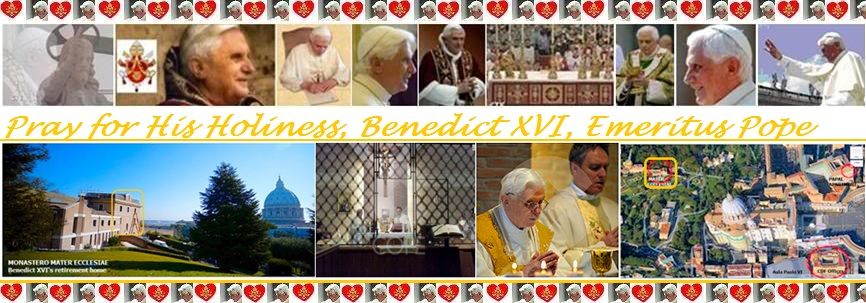 Playing catch-up again, sorry, for Monday...
Playing catch-up again, sorry, for Monday...
[Modificato da TERESA BENEDETTA 18/06/2013 22:43]